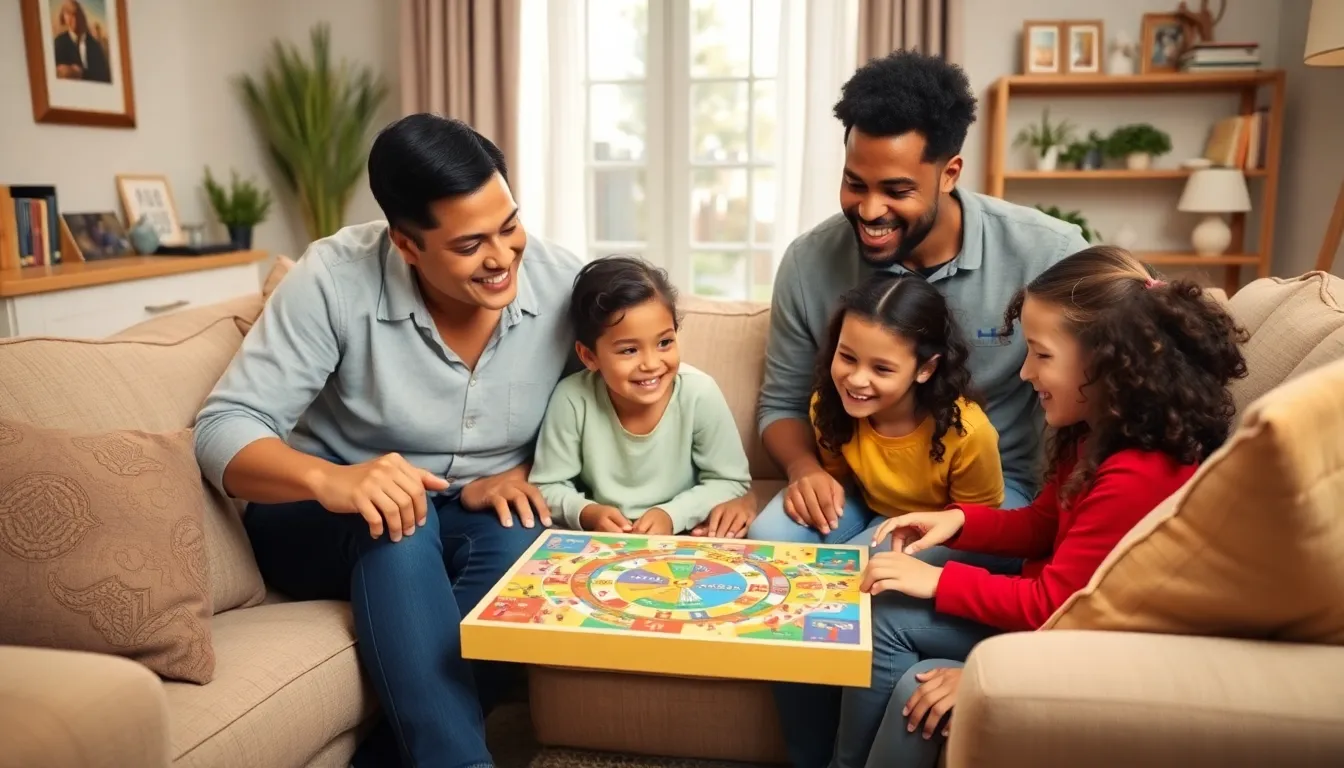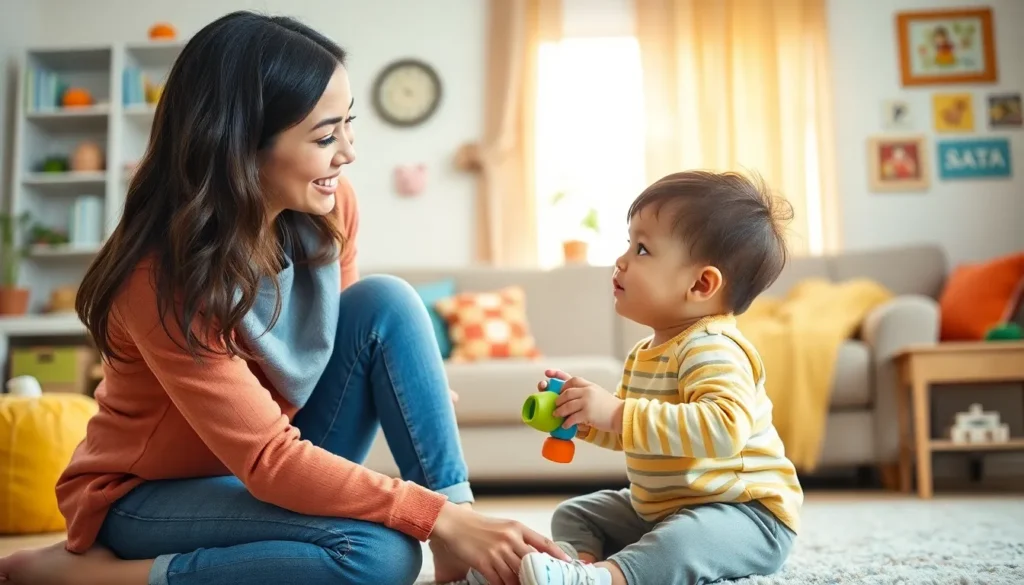In a world where parenting often feels like navigating a minefield, positive discipline offers a refreshing approach that can turn chaos into calm. Imagine a strategy that not only keeps kids in line but also builds their self-esteem and strengthens the parent-child bond. Sounds like magic, right? Well, it’s not—it’s just good parenting!
Table of Contents
ToggleUnderstanding Positive Discipline
Positive discipline promotes respectful communication and encourages children to learn through guidance rather than punishment. This strategy equips parents with tools to address behavior while fostering emotional growth.
Definition of Positive Discipline
Positive discipline involves teaching children how to behave appropriately while respecting their individuality. This method emphasizes understanding rather than mere obedience, allowing children to develop self-discipline. Instead of punitive measures, it focuses on long-lasting behavioral change through encouragement and support. Parents who practice positive discipline create environments where children feel safe to express themselves, thus strengthening the parent-child relationship.
Principles of Positive Discipline
Effective positive discipline rests on several key principles. First, it emphasizes mutual respect between parents and children. Second, it encourages problem-solving skills over simply enforcing rules. Third, this approach promotes consistency in responses to behavior, creating trust and predictability. Fourth, it focuses on teaching valuable life skills, enhancing emotional intelligence. Finally, positive discipline incorporates encouragement rather than criticism, helping children build confidence and resilience. By adhering to these principles, parents contribute to the overall development of their children.
Benefits of Positive Discipline

Positive discipline offers numerous advantages for both parents and children. This approach nurtures emotional well-being and enhances social interactions.
Emotional Development
Emotional development thrives under positive discipline. Children benefit from the increased self-esteem that results from respectful communication. When parents focus on guidance rather than punishment, they help kids learn to regulate their emotions. It encourages children to express their feelings in healthy ways. Parents, by modeling empathy and understanding, instill resilience in their children. The supportive environment fosters secure attachments, promoting confidence as children navigate challenges. Emotional literacy grows as children practice recognizing and articulating their emotions. This growth leads to better relationships in the long run.
Social Skills Enhancement
Social skills enhancement occurs naturally through positive discipline. Children learn to communicate respectfully and resolve conflicts effectively. Parents who actively engage in problem-solving with their children teach them valuable collaboration skills. Working together builds teamwork and understanding of diverse perspectives. Friendships benefit as children develop empathy and learn to recognize others’ feelings. Practicing active listening also plays a crucial role. Children, by participating in group activities, gain opportunities to share, negotiate, and cooperate. These experiences lay the foundation for thriving in both personal and professional relationships as they grow.
Implementing Positive Discipline Techniques
Implementing positive discipline techniques effectively enhances children’s development and strengthens parent-child relationships. These strategies make a significant impact in nurturing respectful communication and guiding behavior.
Strategies for Parents
Parents can utilize various strategies to apply positive discipline. Embracing empathy helps parents understand their children’s feelings. Setting clear expectations establishes a framework for acceptable behavior. Encouragement fosters motivation, while consistent responses provide stability. Engaging children in problem-solving teaches accountability and critical thinking. Parents who model patience show resilience and create a safe space for expression.
Approaches for Educators
Educators play a crucial role in implementing positive discipline in classrooms. Building supportive environments encourages open communication. Incorporating group activities fosters collaboration and conflict resolution skills. Establishing classroom rules with student input promotes ownership and respect. Teachers who reinforce positive behaviors motivate students to develop healthy habits. Integrating social-emotional learning enhances students’ emotional intelligence, guiding them in managing their feelings and relationships.
Challenges in Practicing Positive Discipline
Practicing positive discipline presents unique challenges that caregivers must navigate. Addressing misconceptions and overcoming various obstacles helps strengthen this parenting approach.
Common Misconceptions
Many believe positive discipline equates to permissiveness. This misconception overlooks the importance of setting clear boundaries while maintaining mutual respect. Some think it requires extra time and effort, which can deter parents from adopting it. Effective implementation can actually streamline communication and enhance understanding. Another fallacy involves assuming that positive discipline lacks structure. In reality, it fosters an organized environment through consistent guidance and clear expectations. Misunderstanding these facets can hinder a parent’s intention to utilize positive discipline effectively.
Overcoming Obstacles
Obstacles frequently arise when implementing positive discipline strategies. Emotional responses may challenge consistency, especially during stressful situations. Practicing self-regulation allows parents to manage their feelings. It’s also common for caregivers to feel unsure about appropriate responses, leading to inconsistency. Regularly reviewing positive discipline principles reinforces confidence in decision-making. Family dynamics can complicate the application of these strategies, requiring open communication among all caregivers involved. Finally, creating a supportive community can aid in managing external pressures, reinforcing the positive discipline approach.
Positive discipline stands out as a transformative approach that nurtures both children and parents. By fostering mutual respect and understanding, it paves the way for healthier relationships and emotional growth. This method not only encourages children to learn from their experiences but also equips them with essential life skills.
As parents embrace positive discipline principles, they cultivate an environment where children feel safe to express themselves. The journey may present challenges, but the long-term benefits far outweigh the obstacles. With dedication and consistency, parents can guide their children toward becoming confident and empathetic individuals, ready to navigate the complexities of life.





